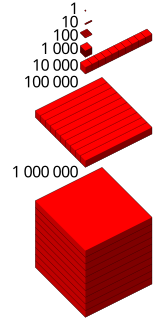| ||||
|---|---|---|---|---|
| Cardinal | eight hundred one | |||
| Ordinal | 801st (eight hundred first) | |||
| Factorization | 32× 89 | |||
| Greek numeral | ΩΑ´ | |||
| Roman numeral | DCCCI | |||
| Binary | 11001000012 | |||
| Ternary | 10022003 | |||
| Quaternary | 302014 | |||
| Quinary | 112015 | |||
| Senary | 34136 | |||
| Octal | 14418 | |||
| Duodecimal | 56912 | |||
| Hexadecimal | 32116 | |||
| Vigesimal | 20120 | |||
| Base 36 | M936 | |||
801 (eight hundred [and] one) is the natural number following 800 and preceding 802.

In mathematics, the natural numbers are those used for counting and ordering. In common mathematical terminology, words colloquially used for counting are "cardinal numbers" and words connected to ordering represent "ordinal numbers".
800 is the natural number following 799 and preceding 801.
801 is the sum of a square and positive cube in more than one way, and a sum of distinct positive cubes in more than one way: [1] [2]
In the gematria of 2nd century bishop Irenaeus, 801 stands for both the Greek word for a dove, and for Alpha and Omega, and therefore represents God in two ways. [3]

Gematria is an alphanumeric code of assigning a numerical value to a Hebrew or English name, word or phrase based on its letters. People who practice gematria believe that words with identical numerical values bear some relation to each other or to the number itself. The number may apply to nature, a person's age, the calendar year, or the like. A single word can yield multiple values depending on the cipher used.

Irenaeus was a Greek cleric noted for his role in guiding and expanding Christian communities in what is now the south of France and, more widely, for the development of Christian theology by combatting heresy and defining orthodoxy. Originating from Smyrna, now Izmir in Turkey, he had heard the preaching of Polycarp, who in turn was said to have heard John the Evangelist.

Greek is an independent branch of the Indo-European family of languages, native to Greece, Cyprus and other parts of the Eastern Mediterranean and the Black Sea. It has the longest documented history of any living Indo-European language, spanning more than 3000 years of written records. Its writing system has been the Greek alphabet for the major part of its history; other systems, such as Linear B and the Cypriot syllabary, were used previously. The alphabet arose from the Phoenician script and was in turn the basis of the Latin, Cyrillic, Armenian, Coptic, Gothic, and many other writing systems.

